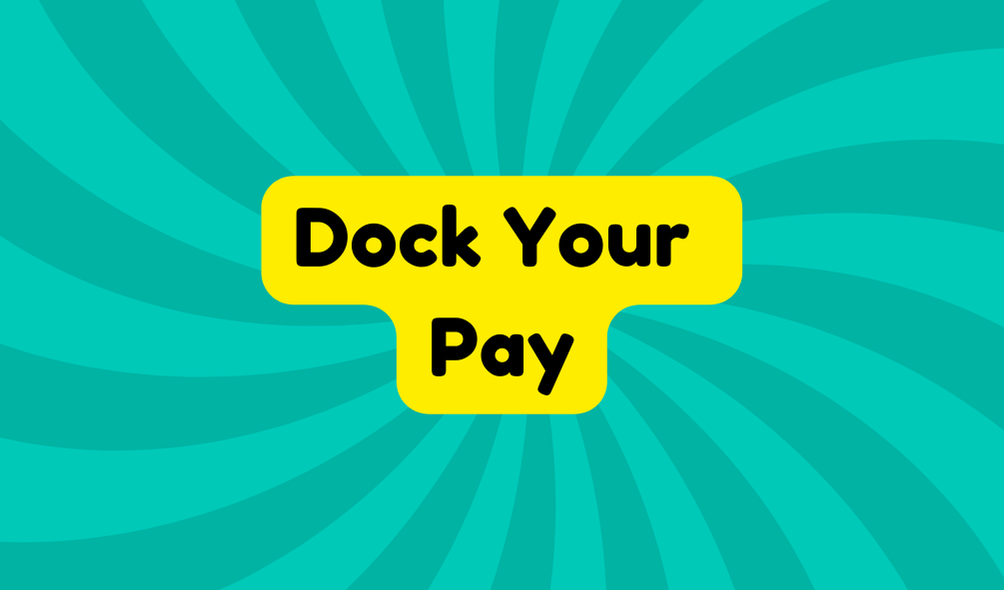"Dock your pay" refers to the practice of reducing an employee's wages due to performance issues, missed deadlines, or disciplinary actions. This approach can create an environment of stress and financial insecurity among workers. It raises questions about fairness and employee treatment in the workplace. Although some argue it holds employees accountable, the negative impact on morale and family life cannot be ignored. Understanding its implications reveals deeper challenges in workplace dynamics, encouraging a closer examination of these conditions.
Synonyms
When discussing the phrase "dock your pay," it becomes essential to explore its synonyms, which can provide insight into its meaning and implications. Terms such as "salary reductions" and "wage penalties" evoke a sense of unfairness that often accompanies financial adjustments. These alternatives carry weighty connotations, reflecting the stark reality of reduced earnings. The emotional impact of such terminology resonates deeply, reinforcing the precarious nature of employment. Key synonyms include:
- Wage deductions
- Payment cuts
- Earnings slashes
- Salary penalties
- Remuneration reductions
Each synonym paints a vivid picture of the potential harshness facing employees in today's rapidly evolving job market.
Example of Sentences
The phrase "dock your pay" can be illustrated through various sentences that capture its meaning and consequences. Employees may find themselves facing pay reductions due to missed deadlines or poor performance reviews. Salary deductions can be the result of disciplinary actions, leaving workers feeling undervalued and anxious about their financial stability.
- A sudden decrease in income can trigger stress.
- Feeling humiliated for the mistakes one makes.
- The looming threat of pay reductions affects morale.
- Financial insecurity disrupts family life.
- A reminder that hard work may go unrecognized.
Such implications highlight the weight of this phrase in the workplace.
Origin
The phrase "dock your pay" has its roots in language that stretches back to Old English, representing concepts of reduction and penalty. Its historical significance is visible in the evolution of employment practices, as it originally referenced cutting short items in tasks or animals. By the late 18th century, its meaning shifted to signify the withholding of wages, often as punishment or consequence for performance deficits. This transformation raises questions about fairness in modern labor relations, highlighting the tension between employer discretion and employee rights. Understanding its origins invites scrutiny into current practices surrounding salary deductions in various workplaces.
Collocations
Collocations surrounding the phrase "dock your pay" reveal a range of related expressions that illustrate the nuanced context of salary deductions. These phrases reflect the emotional weight of financial deductions and salary reductions, emphasizing their impact on workers' lives.
- Unjust penalties
- Hard-earned wages
- Financial strife
- Job insecurity
- Performance scrutiny
Understanding each nuanced term is essential for grasping the implications of salary reductions. They often carry connotations of inequity, drawing attention to the reality faced by employees. Therefore, awareness of these collocations can empower individuals in traversing the complexities of their financial landscape.
How to Use in Everyday Language
Understanding how to use the phrase "dock your pay" in everyday language can shed light on the often harsh realities of workplace dynamics. This expression signifies pay cuts or financial penalties imposed on employees, often as a result of performance issues or disciplinary actions. Such deductions highlight the serious implications of workplace behavior and accountability. In casual conversations, individuals might reference this phrase when discussing unfair treatment or consequences at work. Recognizing its meaning encourages critical discussions about fair compensation and the repercussions of poor job performance—an essential aspect of maneuvering modern employment challenges while fostering an innovative mindset.
Why Is It Still Relevant Today?
In today's job market, where accountability and performance are often scrutinized, the phrase "dock your pay" remains highly relevant. Employers increasingly link financial accountability to employee productivity, reinforcing a culture of measurable results. However, this approach can negatively impact employee morale, as continuous threats of pay reductions create an atmosphere of anxiety and distrust. While aiming for high standards may drive performance, organizations should be cautious, ensuring they foster a positive environment that values workers beyond monetary penalties. Ultimately, balancing financial accountability with employee satisfaction is essential to achieving long-term success in a competitive landscape.







